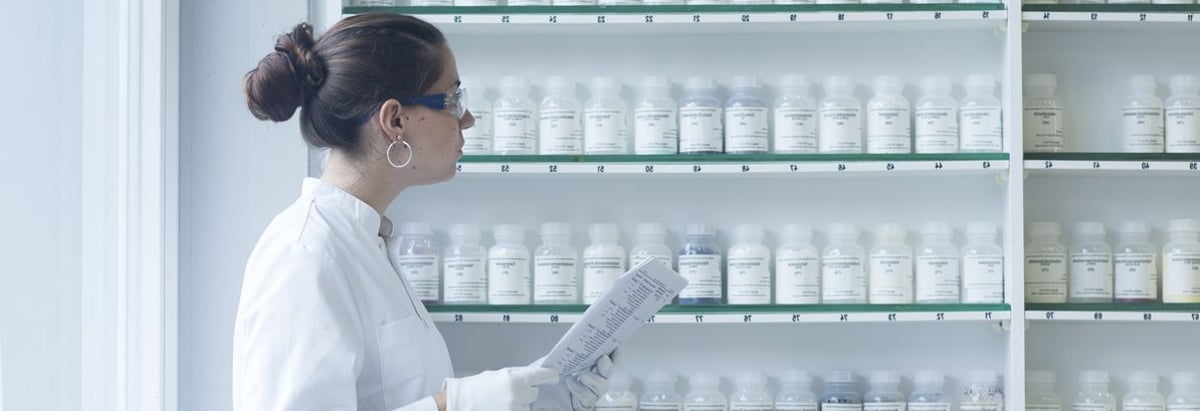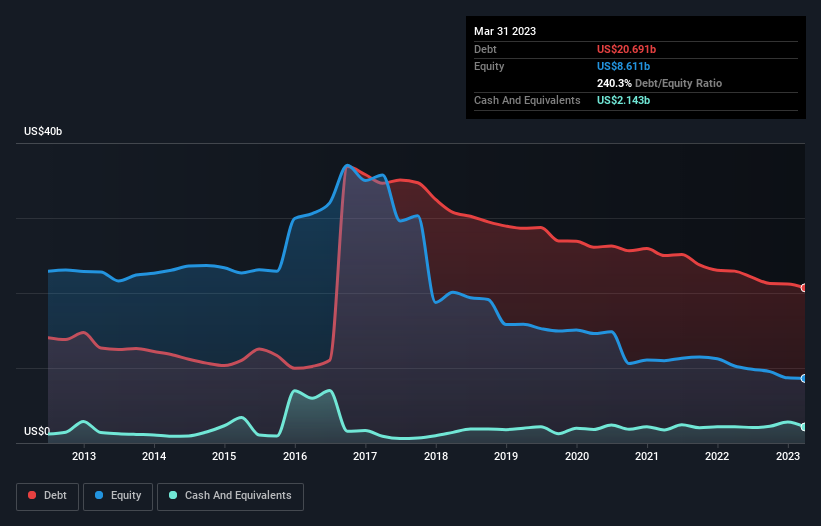- United States
- /
- Pharma
- /
- NYSE:TEVA
Here's Why Teva Pharmaceutical Industries (NYSE:TEVA) Is Weighed Down By Its Debt Load

Howard Marks put it nicely when he said that, rather than worrying about share price volatility, 'The possibility of permanent loss is the risk I worry about... and every practical investor I know worries about.' When we think about how risky a company is, we always like to look at its use of debt, since debt overload can lead to ruin. As with many other companies Teva Pharmaceutical Industries Limited (NYSE:TEVA) makes use of debt. But the more important question is: how much risk is that debt creating?
Why Does Debt Bring Risk?
Generally speaking, debt only becomes a real problem when a company can't easily pay it off, either by raising capital or with its own cash flow. If things get really bad, the lenders can take control of the business. However, a more usual (but still expensive) situation is where a company must dilute shareholders at a cheap share price simply to get debt under control. Of course, debt can be an important tool in businesses, particularly capital heavy businesses. The first thing to do when considering how much debt a business uses is to look at its cash and debt together.
See our latest analysis for Teva Pharmaceutical Industries
What Is Teva Pharmaceutical Industries's Net Debt?
The image below, which you can click on for greater detail, shows that Teva Pharmaceutical Industries had debt of US$20.7b at the end of March 2023, a reduction from US$22.9b over a year. On the flip side, it has US$2.14b in cash leading to net debt of about US$18.5b.

A Look At Teva Pharmaceutical Industries' Liabilities
According to the last reported balance sheet, Teva Pharmaceutical Industries had liabilities of US$10.4b due within 12 months, and liabilities of US$24.4b due beyond 12 months. Offsetting this, it had US$2.14b in cash and US$3.44b in receivables that were due within 12 months. So its liabilities outweigh the sum of its cash and (near-term) receivables by US$29.3b.
This deficit casts a shadow over the US$8.08b company, like a colossus towering over mere mortals. So we'd watch its balance sheet closely, without a doubt. After all, Teva Pharmaceutical Industries would likely require a major re-capitalisation if it had to pay its creditors today.
We use two main ratios to inform us about debt levels relative to earnings. The first is net debt divided by earnings before interest, tax, depreciation, and amortization (EBITDA), while the second is how many times its earnings before interest and tax (EBIT) covers its interest expense (or its interest cover, for short). This way, we consider both the absolute quantum of the debt, as well as the interest rates paid on it.
Teva Pharmaceutical Industries's debt is 4.9 times its EBITDA, and its EBIT cover its interest expense 2.6 times over. Taken together this implies that, while we wouldn't want to see debt levels rise, we think it can handle its current leverage. Investors should also be troubled by the fact that Teva Pharmaceutical Industries saw its EBIT drop by 17% over the last twelve months. If things keep going like that, handling the debt will about as easy as bundling an angry house cat into its travel box. When analysing debt levels, the balance sheet is the obvious place to start. But it is future earnings, more than anything, that will determine Teva Pharmaceutical Industries's ability to maintain a healthy balance sheet going forward. So if you're focused on the future you can check out this free report showing analyst profit forecasts.
Finally, a business needs free cash flow to pay off debt; accounting profits just don't cut it. So we clearly need to look at whether that EBIT is leading to corresponding free cash flow. Over the last three years, Teva Pharmaceutical Industries reported free cash flow worth 17% of its EBIT, which is really quite low. For us, cash conversion that low sparks a little paranoia about is ability to extinguish debt.
Our View
To be frank both Teva Pharmaceutical Industries's EBIT growth rate and its track record of staying on top of its total liabilities make us rather uncomfortable with its debt levels. And furthermore, its interest cover also fails to instill confidence. Taking into account all the aforementioned factors, it looks like Teva Pharmaceutical Industries has too much debt. While some investors love that sort of risky play, it's certainly not our cup of tea. Even though Teva Pharmaceutical Industries lost money on the bottom line, its positive EBIT suggests the business itself has potential. So you might want to check out how earnings have been trending over the last few years.
Of course, if you're the type of investor who prefers buying stocks without the burden of debt, then don't hesitate to discover our exclusive list of net cash growth stocks, today.
Valuation is complex, but we're here to simplify it.
Discover if Teva Pharmaceutical Industries might be undervalued or overvalued with our detailed analysis, featuring fair value estimates, potential risks, dividends, insider trades, and its financial condition.
Access Free AnalysisHave feedback on this article? Concerned about the content? Get in touch with us directly. Alternatively, email editorial-team (at) simplywallst.com.
This article by Simply Wall St is general in nature. We provide commentary based on historical data and analyst forecasts only using an unbiased methodology and our articles are not intended to be financial advice. It does not constitute a recommendation to buy or sell any stock, and does not take account of your objectives, or your financial situation. We aim to bring you long-term focused analysis driven by fundamental data. Note that our analysis may not factor in the latest price-sensitive company announcements or qualitative material. Simply Wall St has no position in any stocks mentioned.
About NYSE:TEVA
Teva Pharmaceutical Industries
Develops, manufactures, markets, and distributes generic and other medicines, and biopharmaceutical products in the United States, Europe, Israel, and internationally.
Very undervalued with reasonable growth potential.
Similar Companies
Market Insights
Community Narratives




